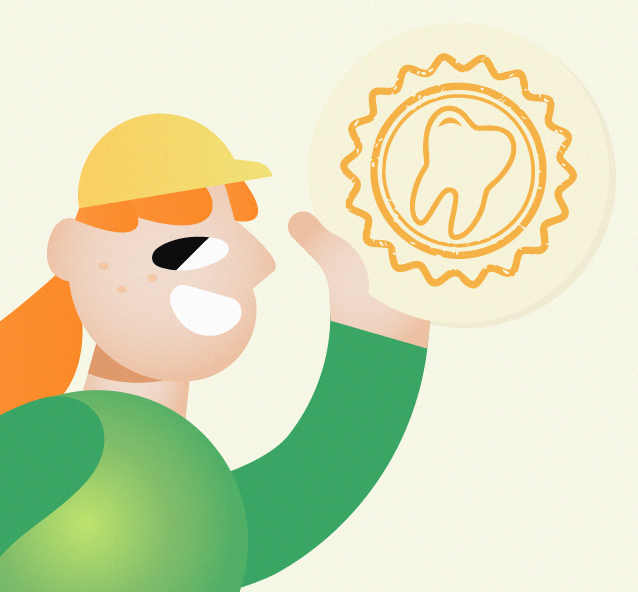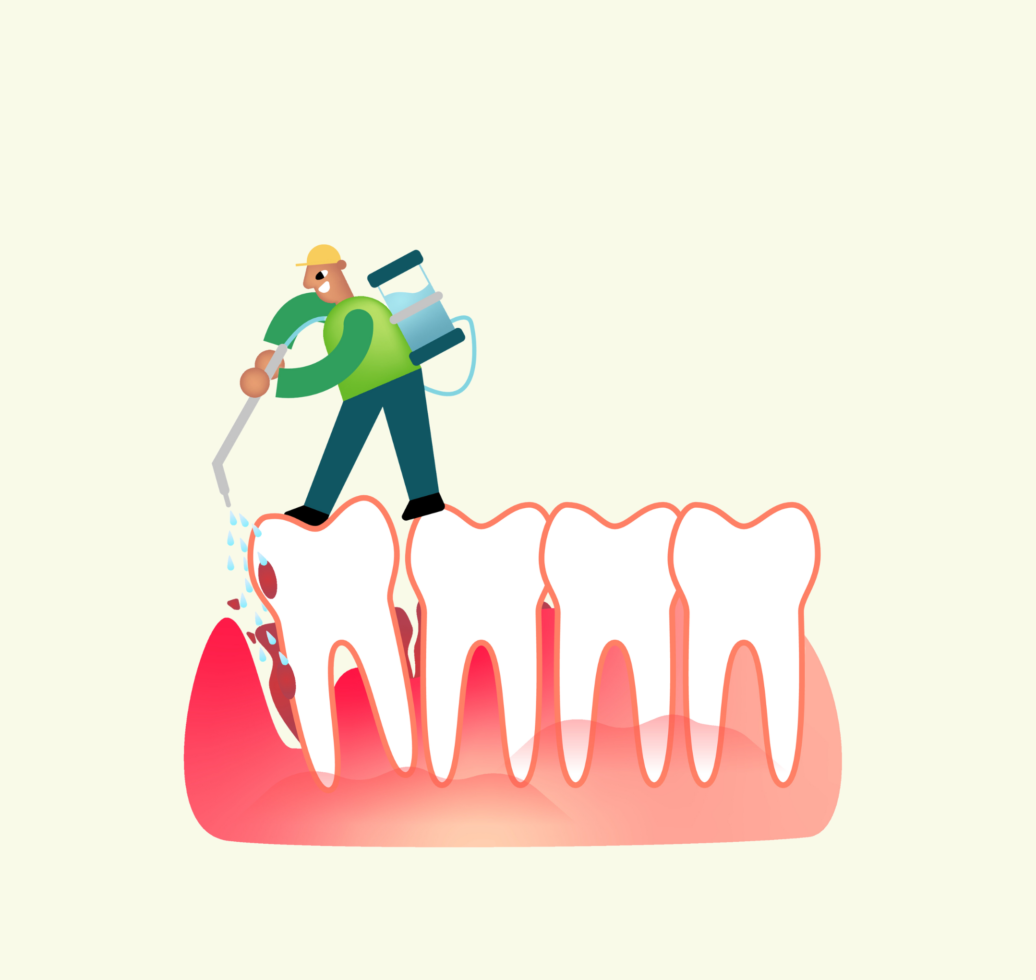Oral surgery
Oral surgery includes all surgical treatments of the mouth, both dental and non-dental.
At Adent Dental Clinics, we offer all dental care under one roof, including oral surgery. More specifically, the oral surgery specialist has trained in the following areas
- Surgical extraction
- Dental implants
- Treatment of diseases of the oral mucosa
- Treatment of acute infections
- Removal of cysts
- Treatment of benign tumours
- Removal of wisdom teeth
Below we answer the most frequently asked questions about the most common dental surgeries.
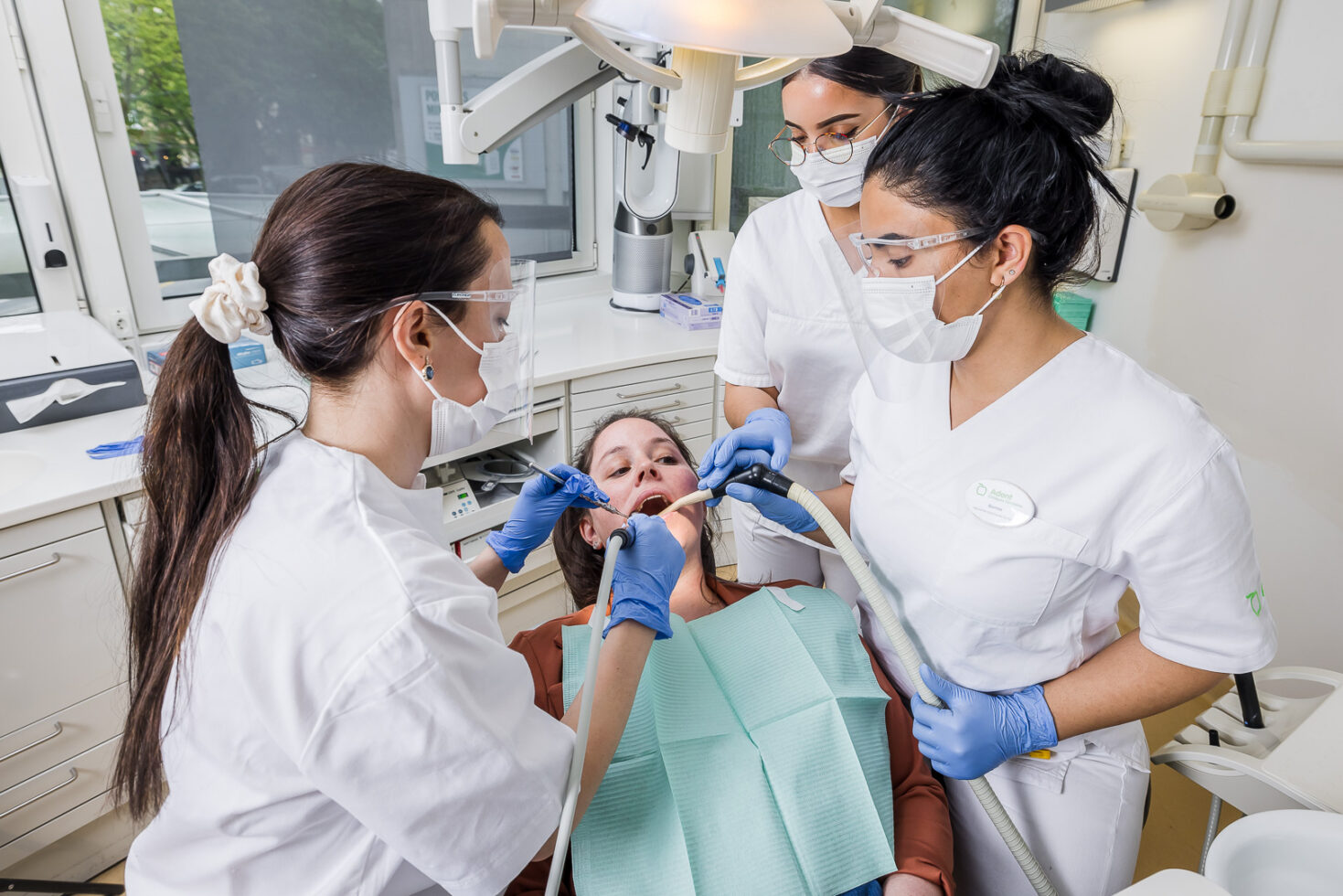
Implants
Adent dental clinics ensure that you get the best possible result with Straumann products that guarantee quality and precision.
Who is the implant intended for?
Dental implants are suitable for anyone with one or more missing teeth.
Good general and oral health is also required for this oral surgery, although contraindications are rare. Dental implants are not recommended in the presence of untreated periodontitis (loosening of the teeth).
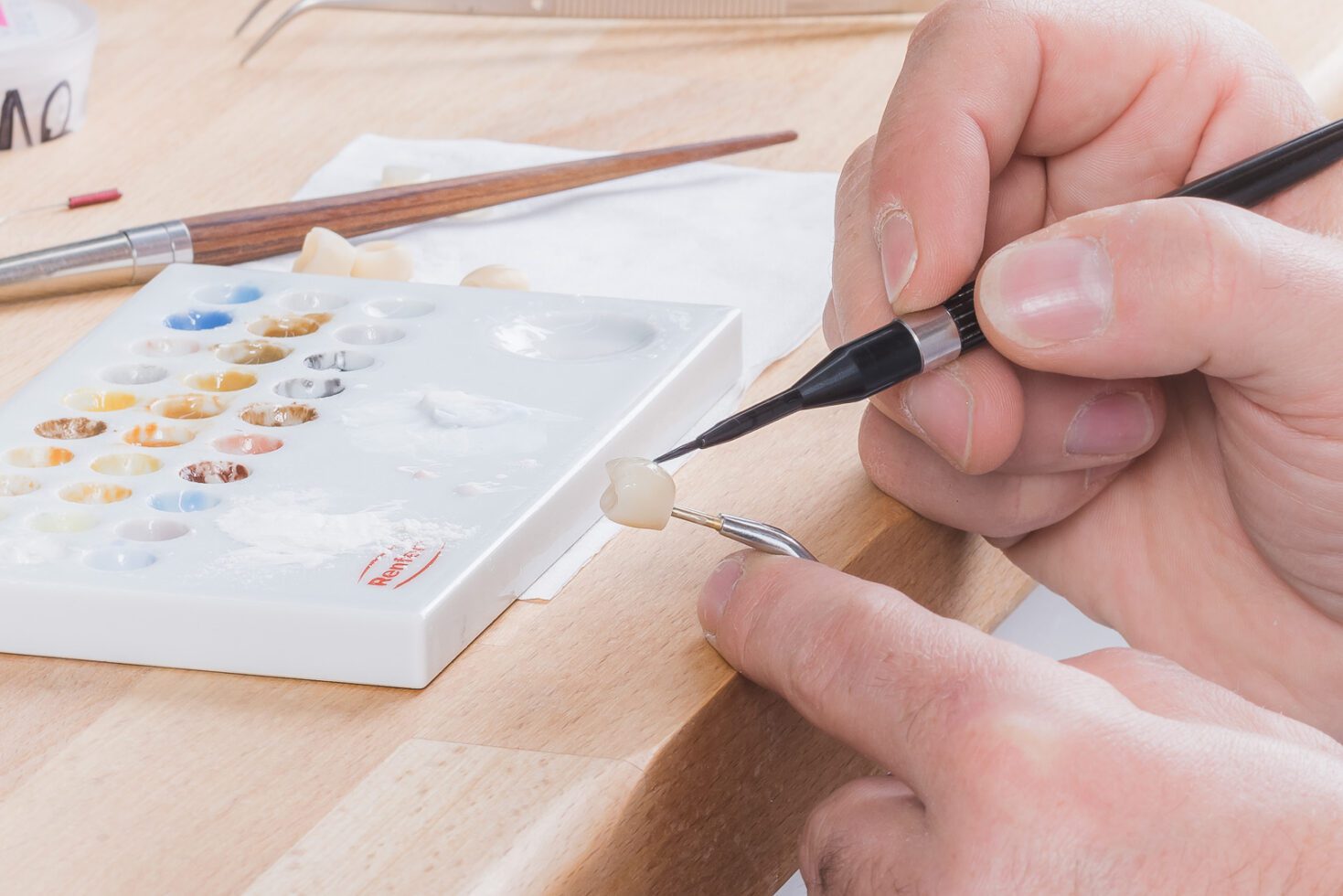
FAQ – Implants
What is an implant?
A dental implant is an artificial root – a kind of screw made of titanium, zirconia or polymer – inserted into the bone to replace a missing tooth.
The implant serves as a support for attaching various elements: a dental crown, a bridge or a removable prosthesis (partial or complete). It can therefore stabilise and considerably improve the comfort of life of wearers of complete dentures. Indeed, the dental implant offers an optimal hold for removable prosthesis and allows to avoid the palate plate for the upper prosthesis.
The same implant can also change its function in the course of a lifetime: initially, it can serve as a support for a crown, and then, after simple oral surgery, it can become the attachment for a mobile prosthesis later on.
How is an implant placed?
The placement of a dental implant requires oral surgery. Most of the time, a short and simple surgical operation, which is similar to a reversed extraction, is sufficient for the placement of the implant. Except in exceptional cases, your dentist can perform the procedure under local anaesthesia directly in his or her dental clinic.
How long does the treatment last?
The total duration of treatment depends on many factors. The following information is intended as a guide only. In practice, healing and implant placement takes between 2 and 6 months. Once the healing of the implants is complete, the fabrication of the final crown or prosthesis can be started.
How much does it cost to have a dental implant placed?
This depends on the number of implants required and the treatments that need to be carried out prior to the oral implant surgery. It is essential that the dentist carries out a preliminary oral examination to assess the care and provide you with a detailed estimate.
Gums
Apart from gingivitis and severe periodontitis, the gums are rarely mentioned. However, they can recede and leave the roots of the teeth exposed with a risk of decay and dental hypersensitivity. Oral surgery may be necessary in this case. To treat such symptoms, dental surgeons perform a gum graft. Gingival grafting restores thickness and height to the weakened gums, therefore stopping their recession.
Oral gum surgery is restorative, preventive and cosmetic, and strengthens the supporting tissue to protect the teeth and often restore a beautiful smile.
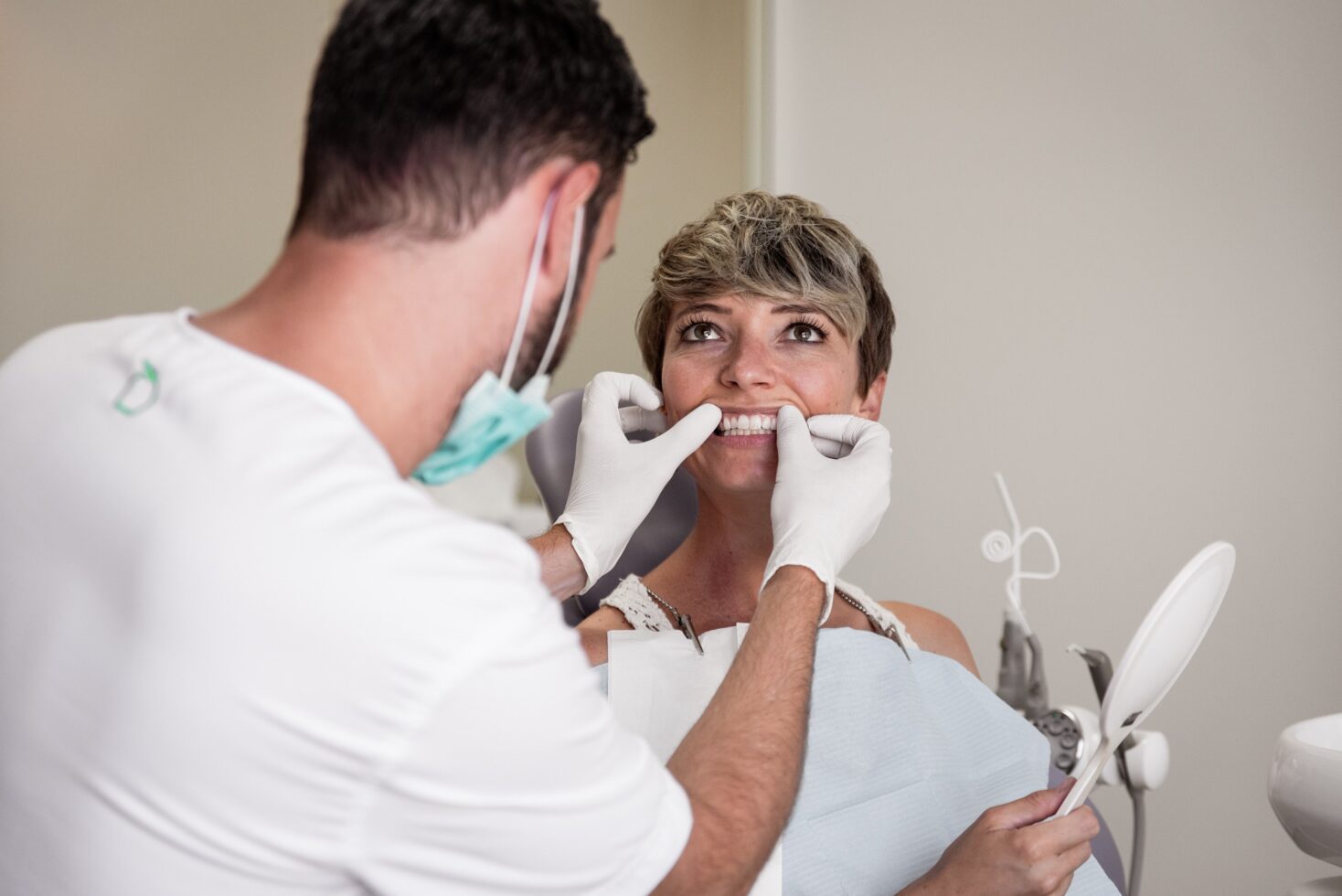
FAQ – Gums
Who should undergo gum grafting?
Gum grafting is suitable for anyone who suffers from severe gum recession on one or more teeth. It also applies to people concerned about the aesthetics of their smile, wishing to regain a harmonious smile following a large receding gum line. This oral surgery can be prescribed for aesthetic or preventive purposes.
What does a gum graft consist of?
Gum surgery consists of taking a piece of gum or palate, the “graft”, to then cover the root of the tooth that has been stripped following loosening. This surgical procedure is performed under local anaesthetic. It is a commonly performed procedure. It is also possible to obtain a collagen graft in order to avoid the removal from the palate.
Wisdom teeth
Are your wisdom teeth bothering you? Avoid complications by having them checked by your dentist.
Wisdom teeth are located at the back of the teeth, behind the molars. There are usually four of them (two at the top, two at the bottom), but sometimes only one, two or three teeth appear. Some people have no wisdom teeth at all.
When they erupt, they usually come out between the ages of 16 and 24. When properly aligned, wisdom teeth can be useful for chewing. However, they sometimes remain partially erupted or embedded under the gum and can become troublesome. In many cases, oral surgery to remove wisdom teeth is recommended.
Indications that may justify wisdom tooth extraction and oral surgery
- Presence of infection or anticipation of future complications
- Presence of cavities and difficulty in cleaning the area properly
- Lack of space or malposition: the wisdom tooth will not erupt in optimal alignment
- Following orthodontic treatment to prevent recurrence
- When wisdom teeth are partially erupted, this situation provides an open door to bacteria that can lead to infection
Wisdom teeth extraction is the most common oral surgery. This procedure is performed in most cases under local anaesthesia, directly in the dental surgery by an oral surgeon.
The maxillary sinuses
The maxillary sinuses are located under the eyes, on either side of the wings of the nose. They are filled with air and have several functions, such as absorbing shocks in the event of blows, humidifying the inspired air, lightening the weight of the skull and increasing the resonance of the voice. They are part of the respiratory system.

FAQ – The maxillary sinuses
Who should undergo oral sinus surgery?
The roots of the pre-molars or molars are sometimes partially contained in the sinuses. If these teeth are lost or extracted, they must be replaced. Sometimes only a thin wall of bone remains between the mouth and the sinuses. One of the requirements for replacing the missing tooth with an implant is sufficient bone thickness and height to ensure the stability of the implant. If the sinus wall is very thin, it becomes impossible to place the implant under good conditions. Oral surgery can solve this problem with a small procedure under local anaesthesia, directly in the dental surgery.
What does maxillary sinus surgery involve?
The sinus transplant is performed by the dentist during oral surgery. There are two possible approaches to this procedure: the crestal approach, which consists of pushing the sinus mucosa upwards when the implant is placed. The lateral approach involves a small opening in the sinus wall from the side. During this oral surgery, the dentist adds bone under the membrane that lines the sinus. The implant can be placed at the same time as the sinus lift or at a later date depending on the initial bone height.
The advantage of this oral sinus surgery is that some patients can benefit from the placement of an implant where a removable prosthesis or a bridge would be indicated.
Dental cyst
The dental cyst is a small ball-shaped growth that is positioned at the end of the root of the tooth. It corresponds to a chronic, latent infection of the tooth and is usually of modest size. It often causes no pain or external signs.
Most of them are benign and can be easily treated by oral surgery.
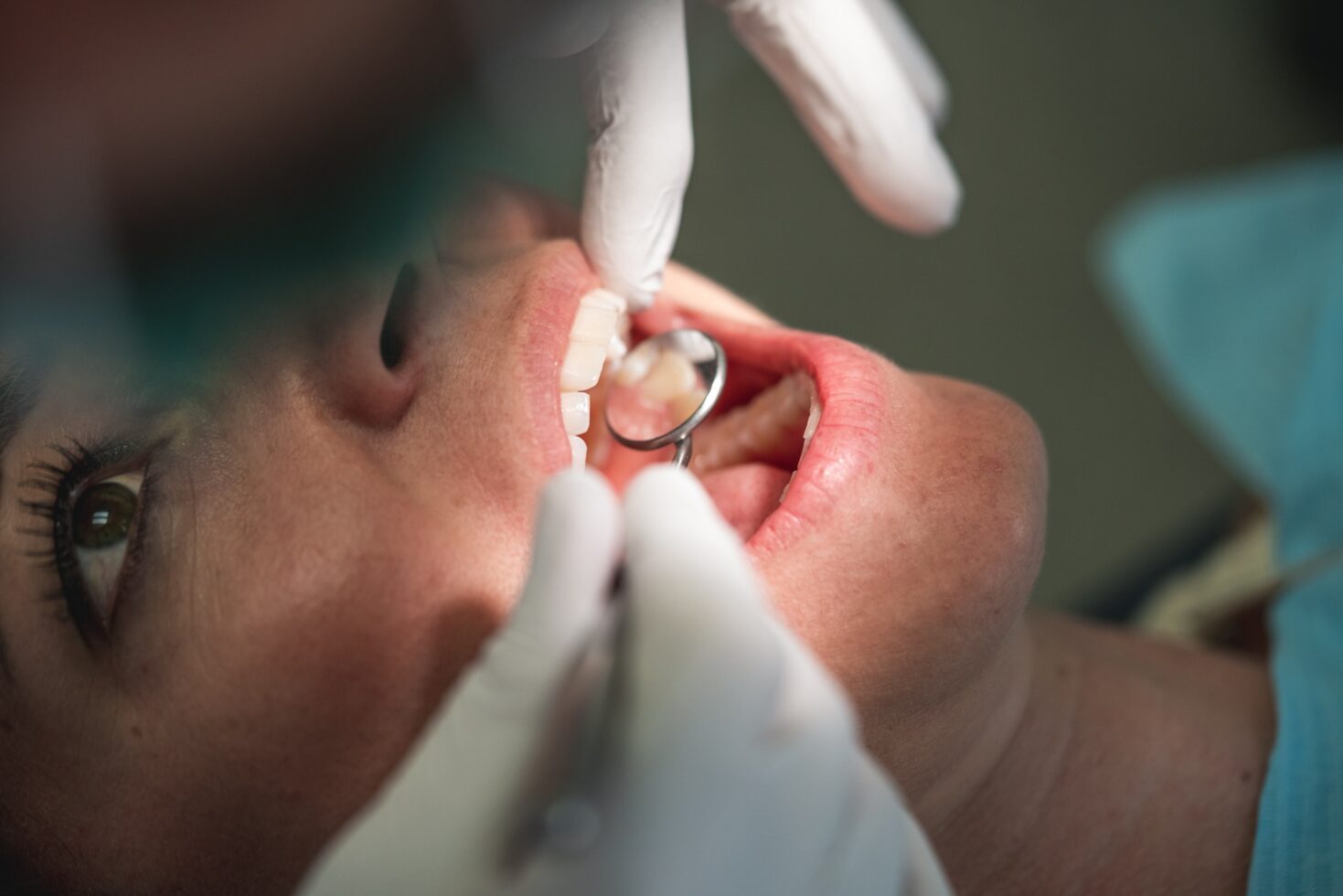
FAQ – Dental cyst
How to detect a dental cyst?
Only an X-ray can detect the presence of a cyst. Oral surgery offers two methods of treating cysts: apical resection (cutting off the apex, or “root tip”) allows the cyst to be removed while the tooth is still in place, without retreating the root and/or removal of the crown. Root treatment is the second way to treat a dental cyst. Antibiotic treatment is sometimes prescribed to the patient after the oral surgery.
The best treatment for your oral health is dental prevention
However, it is important to remember that the best treatment for your oral health is dental prevention. We recommend an annual dental check-up by your dentist and regular scaling by your dental hygienist in addition to daily hygiene care.
Dentists specialising in oral surgery are present in every Adent clinic. This means that you benefit from a complete range of expertise. The range of services offered in each dental clinic promotes cooperation and synergies between specialists and general dentists.


